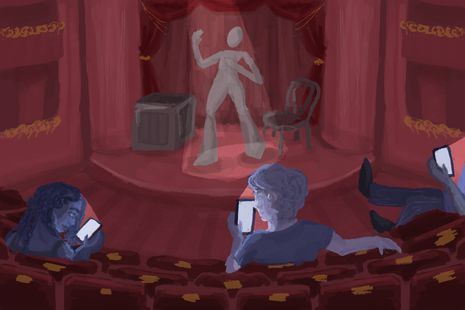Theatre in the streaming age: still relevant, still radical
Leon Rake thinks Cambridge theatre is more important than ever – even as most stories are streamed, swiped, or skipped entirely.

In the age of endless streaming, it’s never been easier to stay in your room. A few clicks and you’re deep into the fourth season of something you didn’t mean to start. Evenings vanish in the glow of a laptop screen, with social plans quietly cancelled for “just one more episode”. Against this backdrop, student theatre might seem like a relic – charming, but a fleeting distraction against the pull of the screen. Yet in Cambridge, where the past and present collide, theatre isn’t just surviving: it’s evolving, offering something streaming never can.
Cambridge theatre is messy, ambitious, occasionally over-lit, but rarely boring. Every term, dozens of shows are staged in colleges, the Corpus Playroom, the ADC, and even the oddest corners of the city. That momentum isn’t just tradition. It’s driven by students who take on 40-hour tech weeks, rewrite scripts between lectures, or spend evenings learning to fake-cry under stage lights. These aren’t people clinging to the past. They’re creating something real, unpredictable, and shared.
“This is one of the few spaces in Cambridge where failure isn’t a crisis, but part of the process”
Streaming services are brilliantly convenient. They offer comfort, distraction, spectacle. They’re also solitary. Even when you’re watching with someone, you’re not really with them. Cambridge theatre, by contrast, is stubbornly collective. You’re in a room with others, watching people you know transform into characters, build worlds, and take risks. There is a vulnerability to that, and an honesty that no algorithm can replicate.
There’s also the matter of relevance. It’s easy to dismiss student theatre as removed from the ‘real world’, but the best Cambridge productions are anything but. They interrogate race, class, gender, politics, and identity. They experiment with form, ask uncomfortable questions, and challenge both performers and audiences to think – and feel – differently. Some shows will miss the mark, but that’s the point. This is one of the few spaces in Cambridge where failure isn’t a crisis, but part of the process. You can write a bad play or cast a friend who can’t act – and still learn something.
Not long ago, I saw Macbeth performed in King’s Chapel. A production that was striking, atmospheric, and unapologetically classical. The chapel’s stone walls and stained glass didn’t just set the scene; they shaped it, lending the entire performance a solemnity that no set could imitate. But the rest was pure student invention: careful direction, powerful performances, and a sense of purpose that carried through every line. It was, in every sense, a Cambridge moment, where centuries of tradition weren’t just background, but part of the drama itself. No streaming service could have delivered that.
“At a time when attention is fragmented and digital fatigue is real, students are still choosing to tell stories face-to-face”
Of course, not everyone feels included in the scene. Cambridge theatre has long had a reputation for being insular, occasionally intimidating, and often dominated by a certain type of student. That perception hasn’t disappeared. For those outside the existing networks, audition notices and production calls can seem confusing at best, alienating at worst. The theatre scene still has work to do in making itself more accessible and diverse, not just in who’s on stage, but who feels welcome in the audience.
Yet, despite those barriers, the appetite is still there. Shows continue to sell out. Auditions still overflow. Even in the post-pandemic landscape, live performance in Cambridge has rebounded with force. That resilience says something. At a time when attention is fragmented and digital fatigue is real, students are still choosing to tell stories face-to-face, in rooms full of strangers who may or may not clap at the end. That’s not just bold. It’s necessary.
Theatre offers something that streaming simply can’t: presence. Not just in the literal sense of people in a room, but in the way it demands your attention. There’s no pause button, no second screen. You can’t skim the good bits or mute the parts that make you uncomfortable. You have to sit with it. In a university where so much of life is rushed, optimised, and assessed, that stillness – however fleeting – matters.
There’s joy in it, too. Watching a friend deliver a monologue you didn’t know they had in them. Hearing laughter ripple through a crowd. Seeing a costume that shouldn’t work, but somehow does. These are small moments, but they linger long after the stream has buffered and the algorithm has forgotten you.
Cambridge theatre is not in competition with streaming. It never could be – not on scale, budget, or ease. But it offers something far rarer. It insists on community, creativity, and a bit of courage. And in a world increasingly mediated by screens, that insistence might be its greatest strength. So the next time you’re scrolling for something to watch, consider going out instead. The play might be brilliant. Or terrible. Or somewhere in between. But it will be live. It will be now. And that still counts for something.
Want to share your thoughts on this article? Send us a letter to letters@varsity.co.uk or by using this form
 News / Right-wing billionaire Peter Thiel gives ‘antichrist’ lecture in Cambridge6 February 2026
News / Right-wing billionaire Peter Thiel gives ‘antichrist’ lecture in Cambridge6 February 2026 Features / From fresher to finalist: how have you evolved at Cambridge?10 February 2026
Features / From fresher to finalist: how have you evolved at Cambridge?10 February 2026 Film & TV / Remembering Rob Reiner 11 February 2026
Film & TV / Remembering Rob Reiner 11 February 2026 News / Churchill plans for new Archives Centre building10 February 2026
News / Churchill plans for new Archives Centre building10 February 2026 News / Epstein contacted Cambridge academics about research funding6 February 2026
News / Epstein contacted Cambridge academics about research funding6 February 2026










